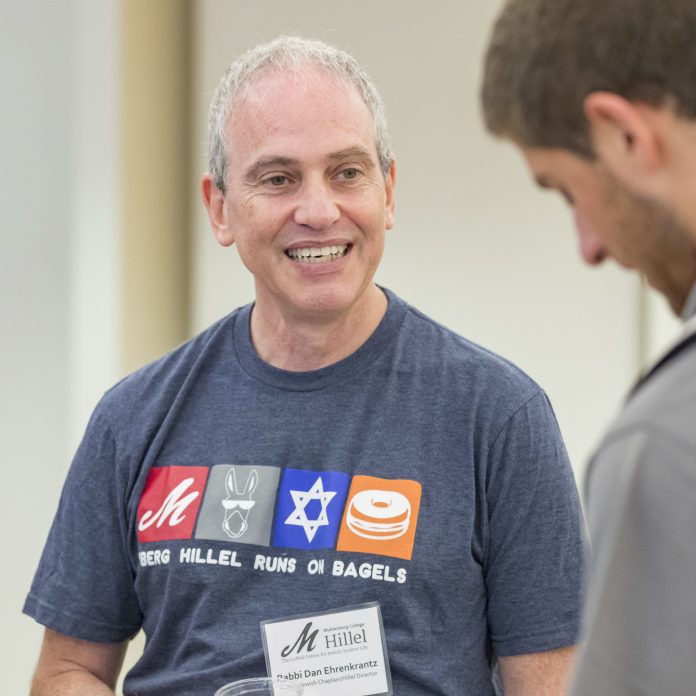This interview has been edited and condensed.
The Muhlenberg Weekly: Introduce yourself to the Muhlenberg community.
Rabbi Dan Ehrenkrantz: “Well, I really love being on campus and love working with students. I have worked with students throughout my professional career, even as a congregational rabbi when the ‘students’ are much younger. I was also the president of a rabbinical school [the Reconstructionist Rabbinical College (RRC)], which was filled with graduate students, and there’s a wide age-range in that population. I served as the interim Hillel director at Wellesley and I’m excited to be back on a campus again.”
MW: You have quite the impressive resume, filled with appearances on Newsweek’s list of the “50 Most Influential American Rabbis” and long tenures at both B’nai Keshet and then as president of the RRC. Can you explain how those experiences translate to working as a Hillel director, something you did at Wellesley and now do at Muhlenberg?
DE: “First, and most importantly: these jobs are about relationships. The importance of developing relationships has been very meaningful and I bring that to this position and to Muhlenberg. Another important part, especially in terms of being an interim, is that you come into a position for a year, and you need to quickly understand both the organization – in this case, Muhlenberg College – and also how Hillel fits into it. My past positions serve me well to be able to quickly pick up what I need to know to do just that.
MW: Although you’ll only be on our campus for a short time, what are you looking to bring or change to Muhlenberg’s Hillel?
DE:“This year, I want both Jewish life on campus and our students to have a stellar experience. The fact that for one year, the Hillel director is interim should not mean that ‘Ok, Hillel doesn’t matter;’ really, this should be a great year for Muhlenberg students and our Jewish students, and I should be able to significantly contribute to that. Also, one of the things that I think about as an interim is ‘What can I do this year that will help the individual who comes into this position next year?’”
MW: Notably, you are a rabbi of Reconstructionist movement, which, even on a campus where one-third of the students are Jewish, is certainly not as well-known as the three major movements in modern Judaism (Reform, Conservative and Orthodox). Can you describe Reconstructionism and how it differs from the other movements?
DE: “The Reconstructionist definition of Judaism is that Judaism is an evolving, religious civilization. It means that Judaism has elements that are not usually associated with a religion, such as Jewish and Yiddish literature, Jewish comedy, dance, food, as well as things like land and language. These are elements that we tend to think of as part of a civilization or culture. But Judaism is this amalgam of these elements, and the Reconstructionist definition understands that religion has played a central role in this civilization. It’s not enough just to say that it’s a civilization, which downplays the significance that religion and religious life has played, so the definition includes this ‘religious civilization.’ It also includes ‘evolving,’ which is to say that Judaism has changed significantly over time and will continue to grow and change.”
“So why is this important? Well, for one thing, it understands that like any other civilization or religion, that it’s the product of the people, like the question ‘who creates American civilization?’ Well, Americans! And so there might be arguments about ‘who is an American’ –we’re having many of those arguments these days. But there’s an overall understanding that the civilization is created by the people. So, as I come into Muhlenberg and our Hillel and ask, ‘who are the Jewish people here?’ I’d say, ‘anyone contributing to Jewish life,’ because that’s fundamentally what Judaism is. People are contributing to Jewish life in these wonderful and creative ways, and for me, that’s how Reconstructionism colors the way that I relate to this job.”
MW: Finally, how did you hear about Muhlenberg? And since your arrival, has anything impressed you about either our Jewish life or campus in general?
DE: “What I always remember hearing about Muhlenberg is that it was a special campus that had done an unusually nice job of creating [a] great life for its Jewish students. I also knew about it in terms of its significantly-sized Jewish population.”
“Muhlenberg is a really warm, welcoming place. It’s very clear that everyone wants me to succeed, and more importantly, for Jewish life on campus to succeed. It was really meaningful that the College held a welcome reception for me, and that the president took time from his schedule to introduce himself and offer support. Also, my Hillel staff has been incredibly helpful. When you walk into a job for only a year, you can only hope that you’re going to have individuals who will help everything go smoothly. Finally, I’ve been impressed by the students. It’s been really nice meeting everyone, even from the beginning during the interviews, and we’ve had great attendance at programs as well.”






















